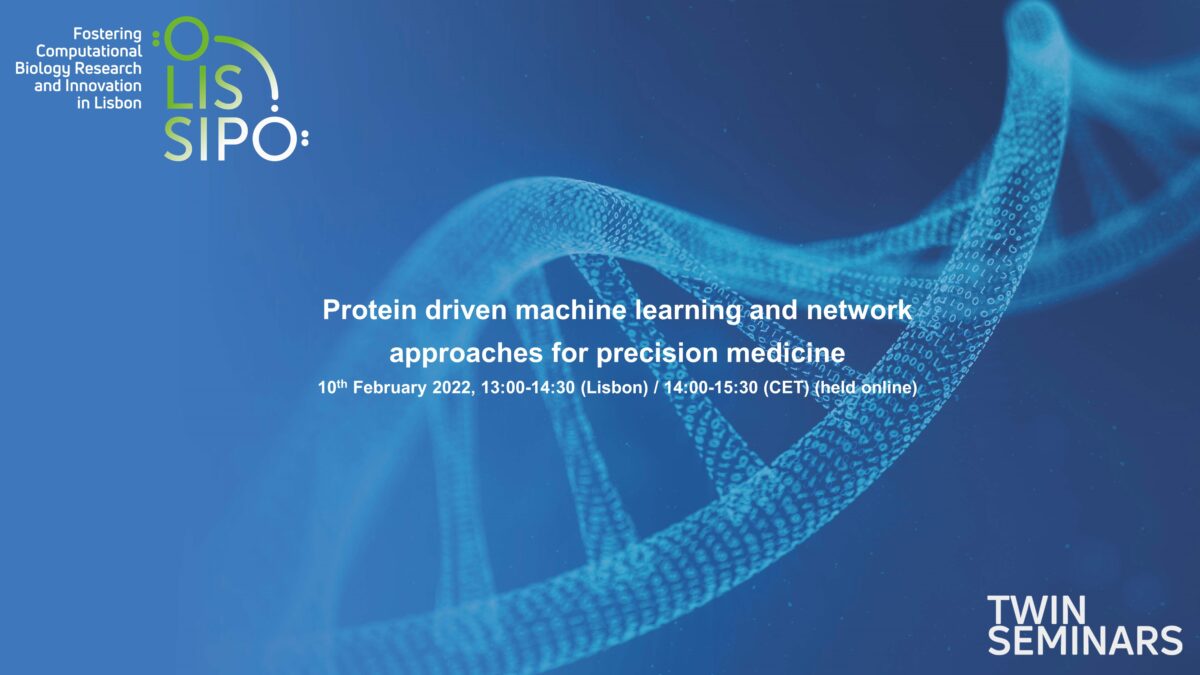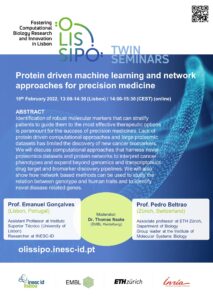
OLISSIPO Twin Seminar III
We are very enthusiastic to announce our third OLISSIPO Twin Seminar on Computational Biology.
The Twin Seminars will contribute to disseminate the scientific work and expertise of INESC-ID and all the Consortium that includes Inria, ETH Zürich and EMBL. These seminars will comprise two short presentations, one researcher from Lisbon and one from a twin international institution working on similar topics in Computational Biology. The seminars will be opened to everyone interested and will include a discussion to further promote the interaction between all the participants.
Protein driven machine learning and network approaches for precision medicine
10th February 2022
13:00-14:30 (WEST – Lisbon) / 14:00-15:30 (CET) (held online)
Emanuel Gonçalves & Pedro Beltrao
INESC-ID | Instituto Superior Técnico | ETH Zürich
Chair/Moderator: Thomas Naake (EMBL)
ZOOM link: https://videoconf-colibri.zoom.us/j/87272445544.
No password or registration needed for this session.
Abstract
Identification of robust molecular markers that can stratify patients to guide them to the most effective therapeutic options is paramount for the success of precision medicines. Lack of protein driven computational approaches and large proteomic datasets has limited the discovery of new cancer biomarkers. We will discuss computational approaches that harness novel proteomics datasets and protein networks to interpret cancer phenotypes and expand beyond genomics and transcriptomics drug target and biomarker discovery pipelines. We will also show how network based methods can be used to study the relation between genotype and human traits and to identify novel disease related genes.
Short Bios
Emanuel Gonçalves, Instituto Superior Técnico (IST) and INESC-ID (Lisbon, Portugal)
Emanuel is an Assistant Professor at Instituto Superior Técnico (IST), University of Lisbon, and INESC-ID. His research interests fall under the areas of Cancer Systems Biology, Bioinformatics and Machine Learning and focus on the development of computational models to provide data-driven hypotheses of biological phenomena for precision medicine. Previously, he was a Senior Data Scientist at precision medicine start-up Ophiomics, Lisbon – Portugal, leading research and development of novel diagnostic and prognostic products for liver cancer patients using machine learning approaches. He’s also a Visiting Researcher at the Wellcome Sanger Institute, Cambridge – UK, where, as a Postdoctoral Researcher, took part and lead international and multidisciplinary projects bridging machine learning with genomic and functional genomic assays, such as CRISPR-Cas9, and proteomics to characterise genetic vulnerabilities of cancer cells and put forward novel clinically actionable biomarkers for precision medicine.
Emanuel graduated in Informatics Engineering (2010) from the University of Minho, where he also completed a Master’s in Bioinformatics (2012), awarded with distinction, with thesis carried-out at the European Bioinformatics Institute, Cambridge – UK. Emanuel obtained his PhD in Systems Biology from the University of Cambridge (2017) with work carried out at EMBL-EBI.
Pedro Beltrao, ETH Zürich (Zürich, Switzerland)
Pedro has a Biochemistry degree from University of Coimbra (2002) and a PhD in Biology from University of Aveiro (2007) for research conducted at the EMBL-Heidelberg under the supervision of Luis Serrano – thesis title “Computational Methodsfor the Study of Cellular Networks”. From 2008 to 2012 he did his postdoctoral research on evolution of signaling systems under the supervision of Prof. Nevan Krogan and Prof. Wendell Lim Lab at UCSF. In 2013 he started a research group at EMBL-EBI and since 20221, Pedro is an associate professor at ETH Zurich, Department of Biology, and group leader at the Institute of Molecular Systems Biology. His research group studies the molecular sources of phenotypic novelties, exploring how DNA changes are propagated through structures and interactions to give rise to phenotypic variability.
We are looking forward to meeting you.




